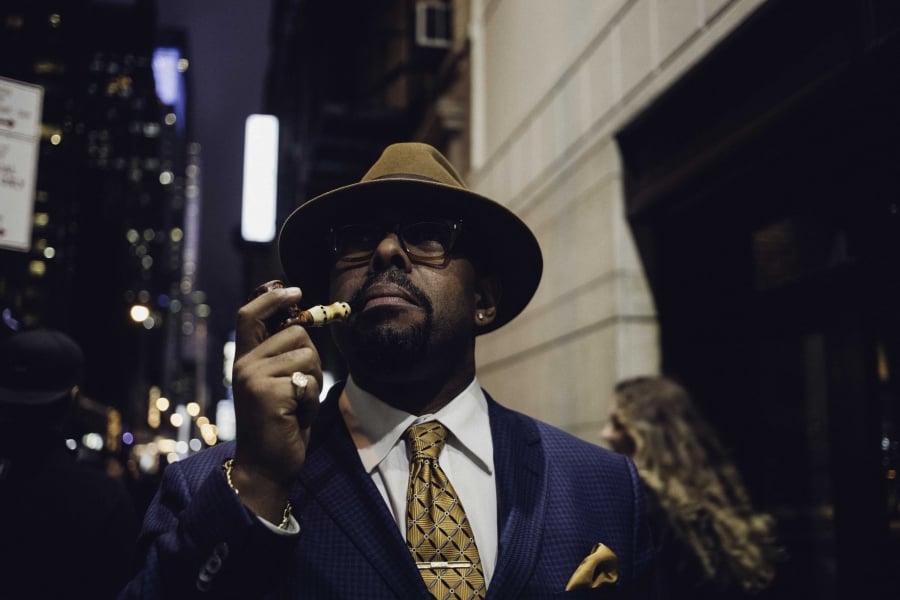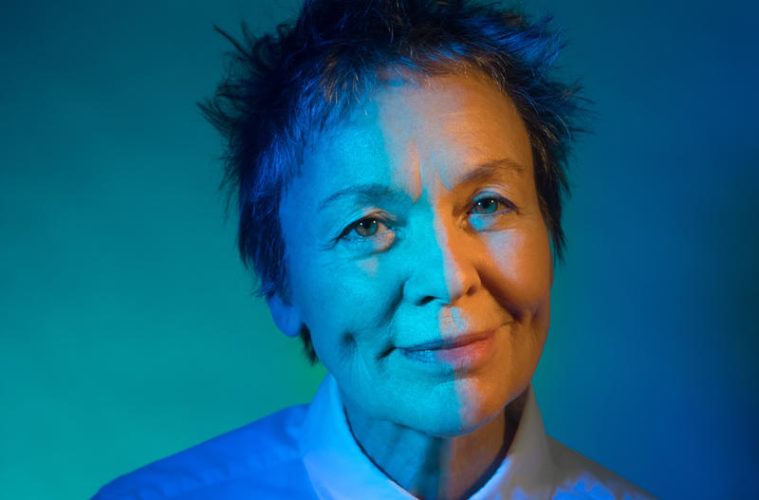“We have no plan,” Laurie Anderson told the crowd at her concert with bassist Christian McBride and cellist Rubin Kodheli at Disney Hall on Tuesday night, January 21. “We have no idea what we’re going to play.”
Anderson’s self-deprecating remarks made it sound like the trio were just winging it, but the all-star group continued with a powerful performance that was unexpectedly moving as they launched music and ideas that were alternately shocking, sad, playful, witty and morbidly despairing. The concert was billed as part of L.A. Philharmonic’s annual jazz series, but the musicians’ interplay was much noisier, darker, more aggressive and more boldly experimental than traditional jazz. Even when the musicians were at their freakiest and most improvisational, there was always a method to their madness, a thematic through line and provocative artistic intent that anchored these free-flying trips around the galaxy to an overriding emotional purpose.
The performance began with a subdued interplay of Kodheli’s cello and McBride’s bass. Wearing a grayish-black jacket over a long black dress with light-brown shoes, Anderson watched and listened for about a minute before she leaned in with a few long streaks of melodic violin. Kodheli was also in black but wearing a dark-red shirt under a black pullover sweater. The cellist’s early patterns were strange and experimental, and Anderson plucked a muted solo within them, which led to a jungle-gym structure of heavy, interlocking riffing by McBride and Kodheli. Early on, a black-suited McBride unleashed a variety of nimble runs on his double bass, and when the intensity dropped back later, he provoked the music forward with a series of hammer-ons. The instrumental passages morphed and mutated with spacious underwater murkiness, lit up occasionally by eerie slices of Anderson’s barely there violin, before the trio summoned forth more thunderous collisions.
The second instrumental piece was more of an atmospheric new-music soundscape, with Anderson’s electronically treated violin sounding like a disembodied and ghostly train, mixed with lowing undercurrents of weaving bass and cello. By now, it was already clear to the audience that this would not be a sentimental journey through Anderson’s past, with performances of ’80s songs like “O Superman.” But it also didn’t feel like a jam session — each piece was markedly different from the previous one, and Anderson’s inventive electronic manipulations shaped the embryonic puzzles into creatively satisfying works.
“We planned an unveiling of an enormous, 60-foot-tall B.B. King hologram,” Anderson announced to start the third piece, a spoken-word odyssey in which she marveled over the peculiar modern fad of concerts with holograms of such dead singers as Maria Callas and Roy Orbison. “We decided to keep him in our head instead because that’s the way that music really works.”
As Kodheli unthreaded a stark cello solo, Anderson mused about climate change, how the polar ice caps were not disappearing but already gone. “I wake up every morning with a combination of dread and disbelief,” she intoned, lamenting about the massive Australian wildfires and the general public’s increasingly blasé reactions to world events like the recent resignation of the entire Russian parliament.
“You gotta love humans in their eternal optimism,” she said sarcastically as the music swelled behind her. “If you think technology will solve your problems, then you don’t know technology and you don’t know your problems,” she warned just before a jagged iceberg of the trio’s strings and electronics rose up and imploded. The sudden surge of chords was big, full and ominous, seconding the serious shift in Anderson’s words.

Christian McBride (photo by Anna Webber)
The fourth piece started spritely and felt like spring. Anderson’s violin plucking turned into a slower melancholic swoon of strings. McBride used a bow to layer in an icily suspended section. “Would you come to me if I was half drowning?” asked a low male voice that came out of nowhere. “The window broke the silence of the matches, the smoke effortlessly floating.”
It was the prerecorded voice of Lou Reed, reciting the lyrics of “Junior Dad,” from Lulu, his 2011 album with Metallica. Anderson had conjured her own aural hologram and brought her late husband back to life for a spell. Reed’s conversational, vulnerable voice mingled warmly within the folds of the string trio’s haunting backing, and there was something poignant about seeing Anderson close her eyes and commune again with Reed with rich lines of violin.
The fifth collaboration was funky and purposefully disjointed, with percussive electronics and the strings stabbing one another from different angles. The sounds shifted and warped and fused together like the static of radio stations spinning quickly past one another on the dial in a blur. At one point, McBride percussively hammered at his bass strings with an open palm. Kodheli tiptoed past Anderson’s weepy violin with muted notes during another unusual solo.
“I have a hologram in my head of Lou Reed,” Anderson said to unlock the sixth piece. Against the austere commiseration of McBride’s bass and Kodheli’s cello, Anderson recited her husband’s lyrics to “Guardian Angel,” from The Raven, Reed’s 2003 album centered on the work of Edgar Allan Poe. After the spoken-word interlude, the music built with intensity as Anderson’s violin roamed in a majestic flight around the room.
The angels theme reappeared in a much different form in the seventh piece, as Anderson recalled the tension in New York City when the vigilante group the Guardian Angels were at their peak. “How involved do you want to be in justice? What banner do you want to carry?” she asked against a shadowy, anxious and noirish groove. As she mulled over the complicated pitfalls of citizen arrests and street justice, McBride set his double bass on the floor and switched to electric bass mid-song.
Returning to an earlier theme, Anderson worried about climate change, calling the looming possibility of human extinction “the story of the end, the biggest story of our time. Is it still a story if no one is listening? What would Phil Glass do? He would make music.” She also cited John Cage (“What would John Cage do? Listen”) and Gandhi (“I think resist”). “What would James Brown do? The answer is get up — get on up, get on the good foot, do your thing.” Anderson triggered a sample of James Brown’s “Get on the Good Foot,” to which the trio began playing before Kodheli buried everything with supersonic waves of cello.
McBride was back on double bass for the eighth piece, as Anderson dialed up a pretty, music box–style melody on keyboards. “What is radical action now?” Anderson asked. “When action seems pointless.” Her vocals were transformed through sound effects so she sounded like a deep, gruff-voiced man as she spun an alternate version of Moses and the exodus, with Moses as an unwilling, uncertain leader. The piece had a heavily electronic drive that carried the room along until it suddenly ended, and Anderson quickly said, “Thank you, good night.”
A sustained standing ovation brought McBride, Kodheli and Anderson back for a bow and then again for an encore. The final piece simmered softly from the stillness, with muted electronics swimming around that made the strings sound like faint reverb jets in the distance. Kodheli’s eloquent cello melodies were arrayed against the combined sheen of McBride’s bass and Anderson’s violin before the trio brought the astral plane in for a soft final landing.
Advertising disclosure: We may receive compensation for some of the links in our stories. Thank you for supporting LA Weekly and our advertisers.

